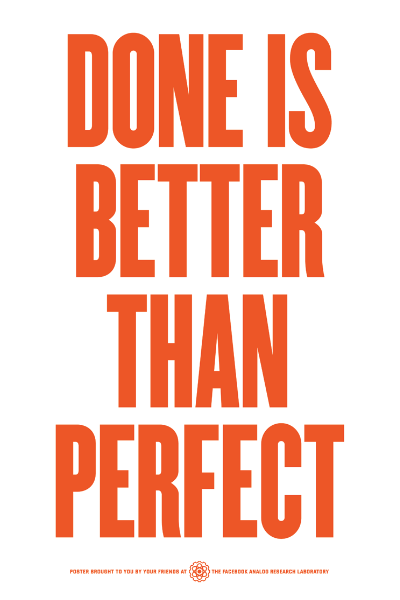I was talking with a friend about his project, and he commented that he hadn’t launched yet because first he’s “gotta be perfect”.
My initial response to this was the maxim I know from the Facebook posters:

“Done is better than perfect” – The Hacker Way
Then, I thought about this idea a bit more, and realized that there’s something much more profound at work that has to do with failure. I’ve recently been realizing that a lot of popular business and personal advice can be summarized as “learn from your failures”—the natural conclusion being that the more failures you have the more you can learn. (There’s an issue here in that you can’t just try to fail, but that’s a topic for a future post.)
The first obvious problem with waiting for perfection before launch is that perfection never comes. Ultimately there’s always one last revision that could be made.
The second, more subtle issue, is that if you wait until you feel you’ve reached perfection before you give your project a chance to fail, then failure is so much worse, because:
I recently read The Now Habit, by Neil Fiore, and one of the useful concepts I took away from it was that procrastination is often caused by two fears: that your failure at an endeavour indicates your failure as a person, and that if you succeed you’ll just be given harder tasks.
“With procrastination, though, you’ve covered yourself both ways: there’s always an excuse, in case you don’t perform as well as you’d hoped; and there’s also some reserve left, if you still do succeed.” – Dr. Derald Sue, as quoted in The Now Habit, p34.
The cool part is, there’s another solution that is much less stressful than procrastination:
To counter perfectionism, try iteration: instead of trying to be perfect from the beginning, you try to do as little as possible to still be acceptable. From there, you improve. I was once chatting with another friend, Alec, while recording a video of a song for YouTube. I returned to the chat after a take, and said “This one wasn’t perfect, but it’s acceptable.” He remarked “Don’t strive for ‘acceptable'” but then after a moment’s reflection, reconsidered:
“On second thought, acceptable is… acceptable”
Acceptable is faster than perfect, but also in many cases you have a chance to improve on it anyway. In the case of the video, I didn’t have hours to practice at the time. In the case of my first friend’s project, he would be much better off getting something out than just sitting at the drawing board all day. The world can’t give you feedback if it can’t see what you’ve done.
Also, if you did everything perfectly in the first place, how could you possibly listen to any feedback?
Constantly consciously expanding the boundaries of thoughtspace and actionspace. Creator of Intend, a system for improvisationally & creatively staying in touch with what's most important to you, and taking action towards it.
Have your say!